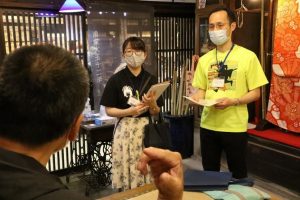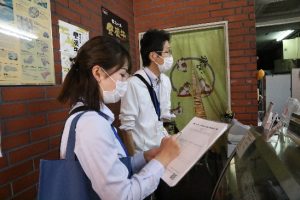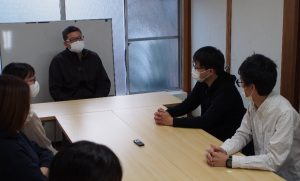Kyoto prefectural workers’ unions survey impacts of pandemic on shopping districts
 Amid the spread of the Covid-19 infections, members of the Association of Kyoto Prefectural Workers’ Unions, while making inquiries into working conditions and demands of their colleagues, discussed what was happening to the lives and livelihoods of residents in Kyoto. In order to get a grasp of this, they conducted a survey in local shopping districts and talked with local business owners.
Amid the spread of the Covid-19 infections, members of the Association of Kyoto Prefectural Workers’ Unions, while making inquiries into working conditions and demands of their colleagues, discussed what was happening to the lives and livelihoods of residents in Kyoto. In order to get a grasp of this, they conducted a survey in local shopping districts and talked with local business owners.
Union members visited each store in pairs. Most of the time they chat with storekeepers while standing, but in some cases, they were taken to the back of a store and were able to have a long conversation.
Starting in shopping districts in Kitano and Nishijin-Senbon near the Kyoto Prefectural Government office building, they visited 431 stores in four rounds of interviews from May to September last year. A total of 90 union members took part in the surveys and were able to hear from 293 stores.
 With survey sheets in hand, union members asked each store about their sales, their business outlook, their use of subsidies for sustaining businesses and other public programs, and municipal services they wanted to receive.
With survey sheets in hand, union members asked each store about their sales, their business outlook, their use of subsidies for sustaining businesses and other public programs, and municipal services they wanted to receive.
Taking advantage of their positions as municipal employees, they also handed out information on benefits and subsidies. Not all the survey participants were familiar with such public support programs available for smaller business owners, so they studied support funds for business suspension request and sustainability benefits beforehand.
A survey conducted at shopping streets in Kamigyo Ward in May last year revealed a very harsh fact: 44% of respondents said that their sales decreased by 50% or more compared to the previous year of 2019. On the other hand, some stores, such as bakeries and Japanese castella cake shops, saw an increase in sales due to a larger demand for goods to be consumed at home.
In shopping streets in Uji City (such as Ujibashi-Dori), located near Byodoin Temple, a popular tourist destination, 60% of respondents answered their sales reduced by 50% or more. The result shows the tourist sites have received greater impacts than the aforementioned area.
 The surveys have revealed: 1) the local economic cycle supported by shopping districts has been stopped by the COVID-19 pandemic; 2) Benefits provided by the national government for suspending business operations are insufficient, so the Kyoto prefectural government needs to take its own measures.
The surveys have revealed: 1) the local economic cycle supported by shopping districts has been stopped by the COVID-19 pandemic; 2) Benefits provided by the national government for suspending business operations are insufficient, so the Kyoto prefectural government needs to take its own measures.
The association created flyers with the survey results and distributed them to shop owners who cooperated with the surveys.
It also used the survey results when it exchanged opinions with the vice governor and provided information to a prefectural department in charge of supporting small- and medium-sized businesses, and when union members had talks with representatives of shopping districts.
Some of feedback from union members who took part in the surveys were:
– “I realized how important it is to visit and listen to the voices of residents and to deliver necessary information to those who need it.”
– “These important activities have brought us in seeing from residents’ point of view how measures we usually inform them of are received and used or not used.”
– “I was not sure if they would talk to us, but we were able to listen to them about their situations and thoughts.”
The association received the following email from a shop owner: “I am very impressed by the efforts public employees made on their days off. And I think such meaningful and important activities should be allowed to be done during their working hours. We are in a state of emergency, but that does not mean that they must use their days off to do this kind of work. I hope I can do something to help improve working conditions of Kyoto prefectural employees.”
